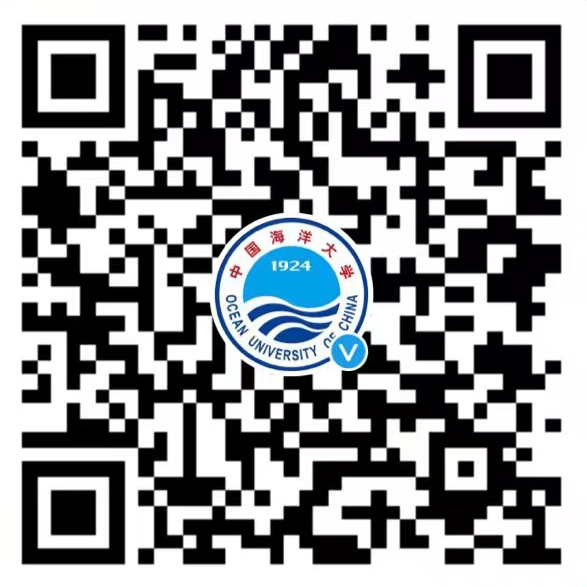On the morning of October 24, the Global Conference on Ocean Cooperation and Development, organized by Ocean University of China (OUC), was held in Qingdao. Over 400 participants from marine-related universities, research institutes and international organizations representing 40 countries and regions attended the conference and engaged in discussions on the future of ocean cooperation and development. Wang Hua, Director General of the Division of Marine Early Warning and Monitoring, Ministry of Natural Resources, Xie Hongjin, Vice Mayor of Qingdao, and Tian Hui, Chair of the OUC Council, addressed the conference respectively. President Zhang Junfeng presided over the opening ceremony. Vice President Liu Yong presided over the keynote report session.
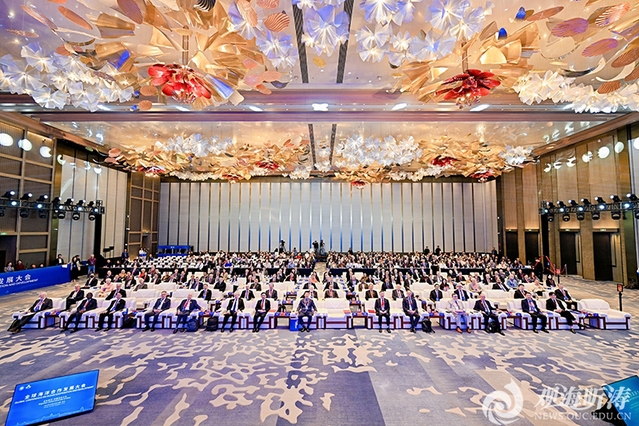
The Global Conference on Ocean Cooperation and Development, with the theme of “advancing marine research and education for the building of a maritime community with a shared future”, is one of the highlight academic events to celebrate OUC’s centenary. With a focus on “academic frontiers, strategic development and future ocean”, it provides a platform for participants to share insights and experience of marine research and education and explore how to address the common challenges faced by humanity in marine protection and sustainable development. More than 290 overseas participants representing over 150 institutions across the globe attended the conference.
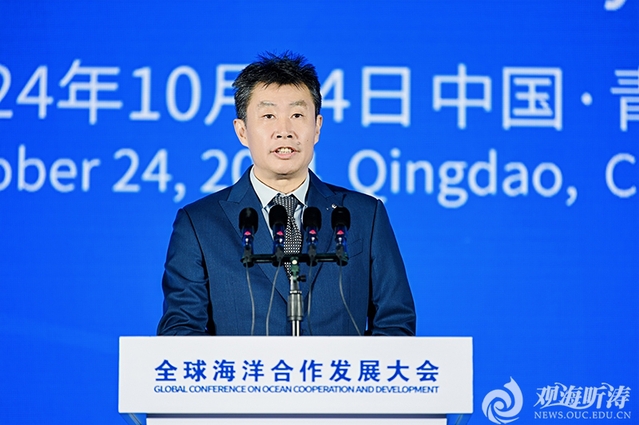
In his speech, Wang Hua expounded on the remarkable progress China has achieved in promoting the high-quality marine development. Following the major global initiative of building a maritime community with a shared future proposed by President Xi Jinping, OUC organized the Global Conference on Ocean Cooperation and Development, providing a platform for global cooperation in marine research and education to advance the building of a maritime community with a shared future.
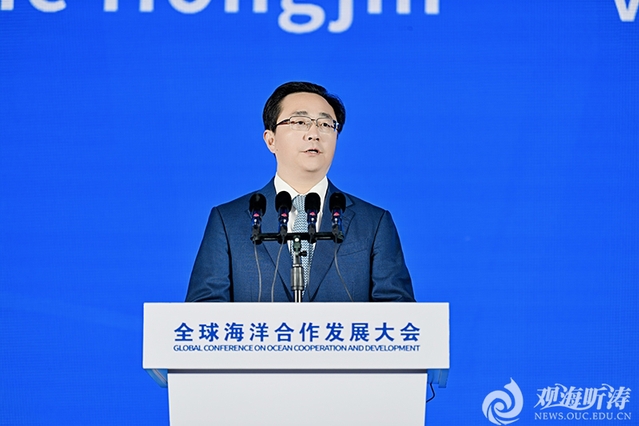
In his speech, Xie Hongjin spoke highly of the significant contributions made by OUC in the past century to the building of a strong maritime country, a strong maritime province and a strong maritime city. In particular, he praised OUC’s achievements in scientific and technological breakthroughs, talent cultivation and the endeavor of a becoming a world-class university in recent years.
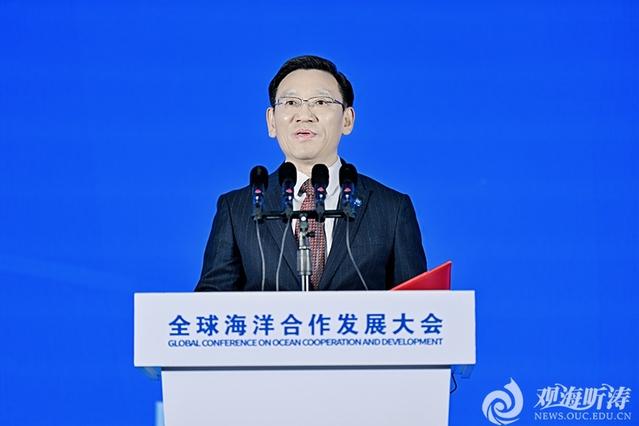
In his speech, Tian Hui highlighted that, over the past 100 years, upholding its founding tenet of “imparting profound knowledge, fostering learned talent and addressing the country’s need”, OUC has made remarkable achievements in promoting marine development, fostering global ocean cooperation, and advancing the understanding, development and protection of the ocean. Ocean education and research play a pivotal role and hold distinctive strengths in advancing the global marine undertakings, promoting global ocean cooperation, and addressing global challenges. Standing at a new historical starting point, OUC is willing to work with all participants to vigorously implement the initiative of building a maritime community with a shared future, promote the innovative development of marine higher education, tackle frontier issues in the marine field, advance the vigorous growth of the blue economy, and foster the sustainable development of the global ocean.
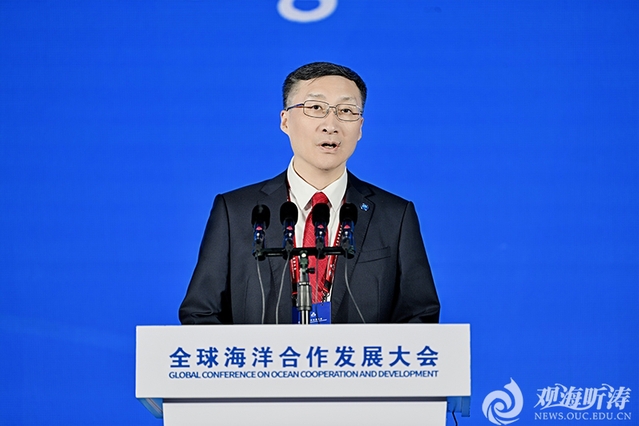
Zhang Junfeng, on behalf of OUC, delivered a keynote report titled Strengthen Global Ocean Science and Education Cooperation for Sustainable Ocean Development: Join Hands to Build a Maritime Community with a Shared Future. With a focus on The Crucial Significance of Ocean to Human Survival and Development, Urgent Need for Enhanced Innovation and Cooperation in Key Marine Fields, and Key Support for Global Ocean Sustainable Development: Talent, Science and Technology, and Collaboration, he elaborated on the importance of the ocean, the significance of building a maritime community with a shared future, ways to promote sustainable marine development, and OUC’s exploration and practices in marine talent cultivation, technological innovation and international cooperation. He emphasized that top-tier talent, technological innovation, and cooperative development are the keys to dealing with global ocean challenges. OUC is willing to work with global partners to strengthen exchanges and cooperation, promote collaborative innovation and jointly build a maritime community with a shared future.
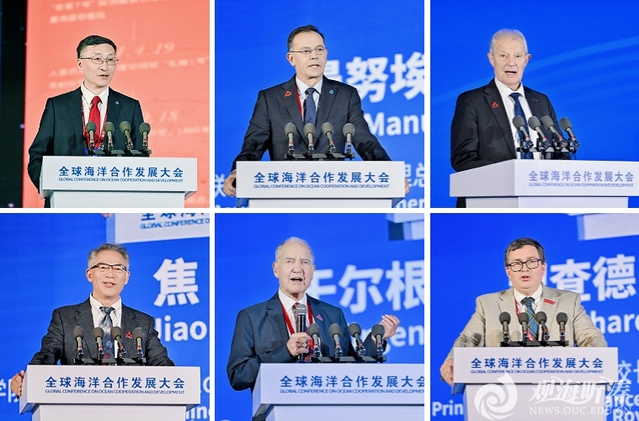
In the keynote report session, six experts and scholars, including Zhang Junfeng, President of OUC, Manuel Barange, Assistant Director-General and Director of the Fisheries and Aquaculture Division of the FAO, Jacques Rougerie, Academician of Institut de France and Founder of SeaOrbiter, Jiao Nianzhi, Academician of the Chinese Academy of Sciences and Chair of the United Nations “Global-ONCE” Program, Jürgen Sündermann, Recipient of Chinese Government Friendship Award and Professor of University of Hamburg, and Richard A. Williams, Principal and Vice-Chancellor of Heriot-Watt University and Academician of Royal Academy of Engineering, delivered reports. Their presentations covered multiple topics, such as marine resource management, marine talent cultivation, marine research, and global ocean cooperation.

Six experts and scholars, including Francis Vallat, Academician of the French Maritime Academy, Honorary President of the French Institute of the Ocean and the French Maritime Cluster, Manuel Barange, Assistant Director-General of the FAO, Li Huajun, Academician of the Chinese Academy of Engineering, Dai Minhan, Academician of the Chinese Academy of Sciences, Lee Hun Wei, Vice-Chancellor and President of Macau University of Science and Technology and Academician of the Royal Academy of Engineering, and Ian Young, Former Vice Chancellor of Australian National University and Chairman of the Australian Education Management Group, participated in the panel discussion. Centering on keywords such as “sustainable development of the ocean”, “global ocean governance”, “maritime community with a shared future”, “blue economy”, “the ocean and climate change”, “the ocean and food security”, and “innovative ocean research and technologies”, they engaged in extensive and in-depth discussions based on their research and practice.
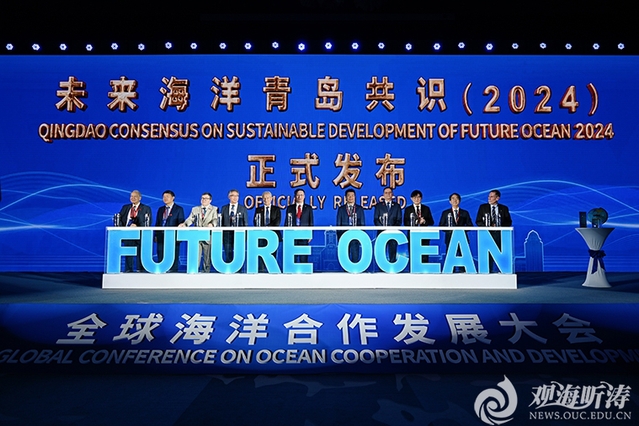
The conference culminated in the official release of the Qingdao Consensus on Sustainable Development of Future Ocean 2024, calling for the global community to care about the ocean, understand the ocean and protect the ocean. The Consensus stands as a shared commitment to strengthening cooperation and common development, and jointly building a maritime community with a shared future.
The conference has 16 parallel sessions, covering such areas as oceanography, fisheries, polar law and research, and big data technology. During the conference, the university also held more than ten bilateral or multilateral talks with delegations from partner universities or international organizations, including Heriot-Watt University, the University of Tasmania, Polytech Nice Sophia, Doshisha University, and the University of Macau. OUC signed cooperation agreements with the University of East Anglia, Yogorsk State University, and Newcastle University. On October 26, the university held an exhibition of award-winning works of the Marine Architecture Design Competition on its West Coast campus.




